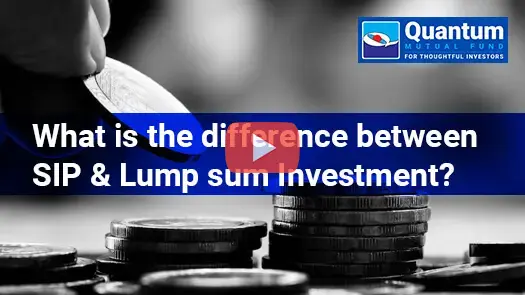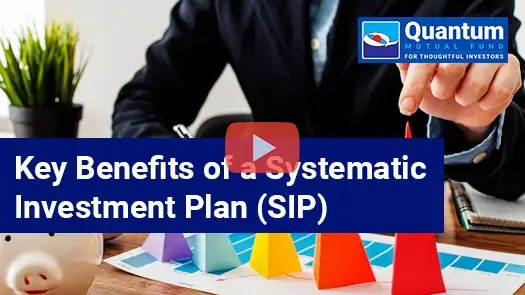Savings and investments play an important role in helping us achieve our financial goals. The journey becomes easier if we are disciplined and follow a systematic path. This is possible with the help of Systematic Investment Plans or SIP that help create wealth and achieve your goals through disciplined investing. Offered by mutual fund AMCs (Asset Management Companies), the SIP allows investors to start with Rs 500 and invest it regularly at pre-fixed intervals of a week, a month, or a quarter, thereby helping them benefit from the rupee cost averaging. Long-term investors of SIP also benefit from the compounding of money. Compounding makes time work in your favour, as the returns you earn are added to your original investment to make the base investment larger, such that the total returns you earn keep increasing over time.
What is SIP?
A Systematic Investment Plan or SIP is a method of investing in mutual funds where the investor decides the amount, the frequency, and the duration of the investment beforehand. Investors can link an SIP investment to a specific goal and decide the amount and the duration accordingly.
How Does SIP Work?
Disciplined investing is essential to achieve your financial goals well in time, and investing in an SIP is one of the best ways to do it. In an SIP, you need to decide the amount that you wish to invest regularly and for a specific period. The investment can be made through the ECS (Electronic Clearance Service)-the auto debit facility wherein you need to fill out a mutual fund scheme application form and the SIP mandate form specifying the amount, frequency, and tenure. These can be decided based on your savings, investment goals, and risk appetite. By choosing SIP, an investor does not need to time the market and invest in a simple and hassle-free manner.
The contribution amount for a mutual fund SIP is automatically debited from the investor’s bank account and invested in the mutual fund selected by them. The mutual fund company, in turn, will allot the equivalent number of units in the investor’s name. Every contribution adds additional units to the investors’ account depending on the market rate. Since each contribution is made at a different time when the market position is different, the investor is allocated a different number of mutual fund units each time. This means the investors get more units when the market is low and fewer units when it is high. Over a longer term, the average cost of purchasing gets reduced.
Again, with every new contribution, the earlier amount contributed by the investor is reinvested. By choosing a monthly SIP or an SIP of another frequency, the investor benefits by rupee cost averaging as well as the power of compounding investments.
Investors can choose to receive the returns of the SIP at a specific interval or at the end of the SIP’s tenure.
Features of SIP
An SIP investment plan encourages investors to save regularly and invest in a disciplined manner. The main features of SIP are:

Allows Investing in schemes
SIP mutual fund schemes allow investors to invest in mutual fund schemes without doing...
SIP mutual fund schemes allow investors to invest in mutual fund schemes without doing any research. Investors just need to zero in on a mutual fund scheme whose investment objective matches their goals and invest in a disciplined manner.

Provides
Convenience
The contribution to an SIP can be directly made from the investor's bank account through the auto-debit..
The contribution to an SIP can be directly made from the investor's bank account through the auto-debit facility. This reduces the chance of investor forgetting to deposit the committed amount.

Encourages Disciplined Investing
SIP requires investors to contribute regularly. The contribution amount is automatically debited...
SIP requires investors to contribute regularly. The contribution amount is automatically debited from the investor’s bank account at the pre-decided frequency. This encourages the investors to discipline their spending and ensure that the contribution amount is available in their bank account.

Needs Only Small Contributions
An SIP can be started with a very small amount. ₹500 or ₹1,000 is good to begin...
An SIP can be started with a very small amount. Rs.500 or Rs.1,000 is good to begin. The earlier you begin, the greater the benefit from the compounding effect of money. This feature encourages people with small savings to invest and generate returns over the longer term.

Rupee Cost
Averaging
SIP plans involve regular contributions at different times, which means the investors are allocated...
SIP plans involve regular contributions at different times, which means the investors are allocated a different number of units at different times depending on the market situation. When the market is low, an investor is allocated more units of the same mutual fund as compared to when the market is high. Over the long run, this averages out the cost of purchasing the mutual fund units.

Option to Stop SIP Contribution
Investors can stop their SIP contributions if they...
Investors can stop their SIP contributions if they find it difficult to continue with the same.
Calculate Your SIP with SIP Calculator
It is a tool that allows you to find out the returns that can be generated by investing a specific amount at pre-decided intervals for a pre-decided duration. You can use the SIP calculator to finalize the amount you wish to contribute to creating the desired wealth or the duration you should invest to generate the desired returns.
Calculated
Result
Total SIP Amount Invested:
Total Growth:
Total Future Value:
*assumes investments are made at the beginning of the month
Best SIP Funds in QAMC
Quantum Mutual Fund offers several mutual fund schemes in India that invest in equities, Gold, bonds, multiple asset. The company allows investors to start an SIP in any of its schemes with an amount as low as ₹500, besides offering an option to hold the units in the Demat mode.

Quantum Long-Term Equity Value Fund
This open-ended equity scheme invests primarily in companies' equity and equity-related securities in the BSE 200 index. The scheme is highly suitable for investors looking for long-term capital appreciation to fulfill their long-term goals.
Quantum Equity Fund of Funds
This fund invests in 5-10 diversified equity schemes of third-party mutual funds that are shortlisted after extensive research.
How Does SIP Help Achieve Your Goals?
SIP is a systematic way of investing wherein you can choose the investment amount, the frequency of investing, and the duration for which you wish to invest. These can be decided in such a manner that you can achieve your financial and other goals.
Let’s say you have a monthly SIP of Rs 10,000 in your chosen mutual fund scheme. By the end of the year, you would have invested Rs 1,20,000. Let’s assume you wish to continue investing for five years. At the end of the fifth year, you would have invested Rs 6,00,000. Assuming a 8% per annum interest rate, the returns at the end of the fifth year will be Rs 1,39,667.
SIP helps you achieve your goals by
Making you disciplined in your saving
and investment amounts
Doing away with the need to time the market
but still benefiting from stock market movements through rupee cost averaging.
Benefiting from money’s compounding power,
the earnings on your investment are reinvested to earn more and create wealth over the long run.

Allowing you to start
early with a small amount.
Offering you the flexibility to enhance the contribution
amount either through top-up SIP or increased contribution after a certain time. You can also take a new SIP with an increase in your income.
Tax-saving SIPs in schemes like ELSS help you
reduce your tax burden
How to Choose the Right SIP?
Choose a tax-saving SIP or a mutual fund for SIP that enables you to meet your financial goal and create the desired amount of wealth. This is possible when you are clear about your financial goals, risk appetite, and the amount that you can regularly spare for investing. Choose a mutual fund scheme whose investment strategy, goals, and risk-return profile match yours.
Know the Difference
SIP Vs Lumpsum
SIP involves regular contribution at pre-decided intervals for a pre-decided duration. At the same time, lumpsum investments require you to invest a specific amount in one go.
SIP Vs ELSS
ELSS is an investment instrument that invests in equity and equity-related instruments, while SIP is a mode of investment in different mutual fund schemes, including ELSS.
How to Invest in SIP?
Mutual fund SIP investment is a simple process but requires you to be clear about your investment objective, risk appetite, and savings. This should be followed by choosing a mutual fund whose investment objective matches your goals, investment horizon, and risk appetite. You also need to check the chosen scheme’s past performance record, expense ratio, and portfolio. You can start an SIP directly through the mutual fund’s website or a distributors.

Mutual fund SIP investment
is a simple process but requires you to be clear about your investment objective, risk appetite, and savings. This should be followed by choosing a mutual fund whose investment objective matches your goals, investment horizon, and risk appetite.

Online Application
If you are a new investor, you need to create an account, followed by completing the KYC details. Once your account is opened, you can specify the SIP details- amount, frequency, and the total duration, which the online payment for the contribution should follow.

Physical or Offline Process
Get the application form and fill it out along with the KYC form. This should be followed by submitting a cancelled cheque and filling out the auto-debit form. Submit all other documents required.
Whether you go for online SIP investment or offline, you will need to choose a date to start the SIP. The mutual fund will take a specific time (15-20 days) to activate your SIP. You will also need to fill in the frequency and SIP duration details. These can be decided by using a mutual fund SIP calculator to estimate the returns on your investments
SIP-Risks and Benefits
SIP funds allow disciplined investing, do away with the need to time the market through rupee cost averaging, and offer the benefits of compounding money. It is a simple way of investing in stocks and other instruments, even when your savings are small.
The risks associated with SIP investments vary for different types of mutual funds. Funds that invest in equities carry more market-linked risks than the ones that invest in debt or both equity and debt in a balanced manner. Mutual fund managers carry out extensive research and pick suitable strategies to manage the risk associated with their investments. So, the choice of mutual fund and the scheme’s investment objective play an important role in managing the risk associated with SIP investments.
SIP-Advantages and Disadvantages
SIP investments are convenient and do away with the need to time the market. But there are certain disadvantages associated with them. Since it is dependent on consistent flows, a change in job or unemployment might cause a break in your SIP investment journey. For investors who do not have regular pay, lumpsum may be suited better.
Know More About SIP
-
What is Systematic Investment Plan (SIP)?
SIP is most popular way to invest in market and it is best way to create wealth for long term which gives a discipline to save at a regular period. Comment if you have any questions regarding SIP.
-
What is the difference between SIP & Lump sum Investment?
Mr. Harshad Chetanwala, Head - Customer Delight explains what is the difference between SIP and lump sum investments. He further also adds why SIP is always a better way of investment when it done for long term.
-
Key Benefits of a Systematic Investment Plan (SIP)
Just as a fitness routine involves regular exercise, and a healthy diet to achieve long-term fitness goals, a SIP involves regular investments of a fixed amount in mutual funds to achieve long-term financial goals.
-
Learn How to Invest in Quantum Mutual Funds?
Check out this video to learn how to invest online in Quantum Mutual Funds. Invest in various mutual fund schemes and diversify your investment portfolio with our 12-20-80 Asset Allocation formula.
Product Labelling
| Name of the Scheme | This product is suitable for Investors who are seeking* | Risk-o-meter of Scheme |
|---|---|---|
|
Quantum Long Term
Equity Value Fund An Open Ended Equity Scheme following a Value Investment Strategy |
• Long term capital appreciation • Invests primarily in equity and equity related securities of companies in S&P BSE 200 index |

Investors understand that their principal will be at Very High Risk. |
|
Quantum Equity Fund
of Funds An Open Ended Fund of Funds scheme Investing in Open Ended Diversified Equity Schemes of Mutual Funds |
• Long term capital appreciation • Investments in portfolio of open-ended diversified equity schemes of mutual funds registered with SEBI whose underlying investments are in equity and equity related securities of diversified companies. |

Investors understand that their principal will be at Very High Risk. |
*Investors should consult their financial advisers if in doubt about whether the product is suitable for them.
Disclaimer: The views expressed here in this Article / Video are for general information and reading purpose only and do not constitute any guidelines and recommendations on any course of action to be followed by the reader. Quantum AMC / Quantum Mutual Fund is not guaranteeing / offering / communicating any indicative yield on investments made in the scheme(s). The views are not meant to serve as a professional guide / investment advice / intended to be an offer or solicitation for the purchase or sale of any financial product or instrument or mutual fund units for the reader. The Article / Video has been prepared on the basis of publicly available information, internally developed data and other sources believed to be reliable. Whilst no action has been solicited based upon the information provided herein, due care has been taken to ensure that the facts are accurate and views given are fair and reasonable as on date. Readers of the Article / Video should rely on information/data arising out of their own investigations and advised to seek independent professional advice and arrive at an informed decision before making any investments. None of the Quantum Advisors, Quantum AMC, Quantum Trustee or Quantum Mutual Fund, their Affiliates or Representative shall be liable for any direct, indirect, special, incidental, consequential, punitive or exemplary losses or damages including lost profits arising in any way on account of any action taken basis the data / information / views provided in the Article / video.
Mutual fund investments are subject to market risks read all scheme related documents carefully.
Frequently Asked Questions
An SIP is an easy, and simple way to invest in mutual funds since it allows you to start with a small amount besides doing away with the need to analyse and study market conditions.
SIP investments allow you to make money through the power of compounding, wherein your invested amount and its earnings are reinvested to earn more and create wealth over time.
Choose an SIP based on the scheme’s investment objective and strategy and risk profile.
SIP investments in Equity Linked Saving Schemes or ELSS are eligible for tax exemption under Section 80C of The Income Tax Act.
The mutual fund uses your SIP investments to invest in different instruments like equity and debt or a combination of both. Your contributions are invested and reinvested along with returns earned on the earlier contributions to generate more returns. This power of compounding helps an SIP generate returns.
You may choose an SIP depending on the frequency of income and expenses. You can invest a very small amount on a daily basis or a slightly larger amount on a weekly basis. Most people receive their salaries on a monthly basis and prefer to invest in an SIP on their payday.
The answer will depend on the CAGR (compounded annual growth rate). Let’s say the CAGR is 8%, and you will need to invest Rs. 16,977 per month for 20 years to reach a corpus of Rs 1 crore.
SIPs work both in bull and bear markets. This is because of rupee cost averaging benefit which allows you to buy more units during a bear market and less during bull market, thereby averaging your cost.






